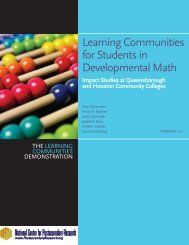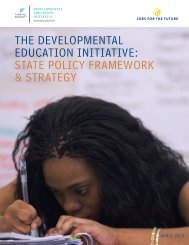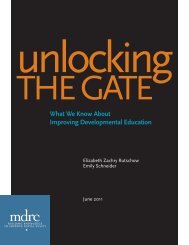Preparing High School Students for College - ERIC - U.S. ...
Preparing High School Students for College - ERIC - U.S. ...
Preparing High School Students for College - ERIC - U.S. ...
- No tags were found...
You also want an ePaper? Increase the reach of your titles
YUMPU automatically turns print PDFs into web optimized ePapers that Google loves.
partnerships <strong>for</strong>med by K-12 school districts (and their high schools) and local colleges asthey work to prepare high school students to take credit-bearing courses upon college entry.To address these goals, we carried out three activities: (1) a search and analysis ofthe relevant research and Texas policy literature (the results of which appear in the nextsection of this chapter), (2) an online scan of college readiness partnership programs inTexas with a web presence, and (3) a series of four trips to visit multiple high schools,colleges, and community-based organizations in the Houston and Dallas–Fort Worth areas.The research was conducted in Texas due to its policy focus on issues of college access andreadiness and because of NCPR’s involvement in related research projects in the state.The Promise of <strong>College</strong> Readiness Partnerships and ProgramsA Definition of <strong>College</strong> ReadinessWhile various definitions of college readiness are found in the literature (Greene &Forster, 2003; Roderick, Nagaoka, & Coca, 2009; Sedlacek, 2005), college readiness hasoften been defined as the absence of a need <strong>for</strong> remediation in math and English. In recentyears, more nuanced views, such as those of David Conley, have gained credence. Conley’s(2010) college readiness framework provides a comprehensive description of theknowledge and skills students need to succeed in college beyond simple academicper<strong>for</strong>mance measures. Based on extensive research, Conley identified four interdependentskill areas that comprise college readiness: key content knowledge in reading, writing, andother core academic subject areas; college knowledge, i.e., the “privileged in<strong>for</strong>mation”needed to prepare <strong>for</strong> and apply to college and the contextual awareness skills needed to besuccessful there; academic behaviors, such as self-awareness and self-monitoring; and keycognitive strategies, such as intellectual openness and problem solving.Terenzini, Cabrera, Deil-Amen, and Lambert (2005) also underscore the importanceof these skill areas. Their conception of college readiness emphasizes academic skills andknowledge as well as the need <strong>for</strong> college awareness and parental involvement andencouragement. According to these researchers, the process students undergo to becomeaware of and ready <strong>for</strong> college is complex and starts as early as in middle school.Other researchers (Rosenbaum, 2001; Sedlacek, 2005) have stressed the importanceof noncognitive domains. Rosenbaum (2001) found that students’ homework completion,interest in school, participation in activities, attendance, leadership, and discipline were allpositively related to postsecondary educational attainment. Sedlacek (2005) discussed thesignificance of such noncognitive factors as adjustment, motivation, long-range goals,3





